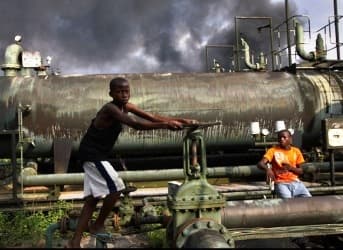Nigeria is Africa’s leading petro-state, currently exporting just over two millions barrels per day (bpd).
But the massive corruption associated with the overwhelming influx of oil revenues has produced major unrest in the country, leading to the Movement for the Emancipation of the Niger Delta (MEND) protesting the inequity.
A second element in the country’s unrest is the Islamist movement, Boko Haram. Nigeria’s population of 150 million is roughly equally divided among Christians and Muslims, who primarily inhabit the north of the country.
The government of President Goodluck Jonathan has largely co-opted the former with an employment program for former disaffected MEND members, but Boko Haram remains more problematical.
The scope of the thievery of oil revenues by Nigeria’s elite is staggering. Five years ago Nigeria’s Economic and Financial Crimes Commission (EFCC) head Nuhu Ribadu declared that more than $380 billion has either been stolen or wasted by Nigerian governments since independence in 1960. Bolstering Ribadu’s observations, a July 2010 academic study of corruption in Nigeria’s oil sector noted that successive governments have mismanaged the oil wealth, “salting it away in foreign bank accounts rather than investing in education, health and other social investment and mismanaging the national economy to the point of collapse.”
Last year 40 per cent of Nigerian government revenues came from oil income. In 2008 by a government committee described the Nigerian National Petroleum Corp. (NNPC) as “simply a typical Nigerian State institution that operates as a huge amorphous cost center with little or no sensitivity to the bottom line.”
Despite the massive oil revenue influx, 80 per cent of Nigerians living on less than $2 a day, while across Nigeria, public services have deteriorated and poverty is growing, sharpening ethnic divisions and fostering bitter parochial politics in which ethnic group’s clans and sub clans battle for the remaining national revenue pie. The life expectancy in Nigeria is 52 and 53 years for men and women respectively, a rate amongst the lowest in the world.
But now, it would seem that Abuja is beginning to quell the country’s Islamic insurgency, using Saudi Arabia as a negotiating intermediary. Abu Mohammed Ibn Abdulaziz said in the Boko Haram northern stronghold of Maidugiri city, "We are not actually challenging the state, as people are saying, but the security [forces] who are killing our members, children and wives. If this government is sincere, [attacks] will come to an end."
Abdulaziz’s comments are significant, as it is the Boko Haram’s first public pronouncement since Nigerian security forces announced two months ago that they had killed Boko Haram spokesman, known the alias Abu Qaqa.
According to Abdulaziz, Boko Haram is willing to begin peace talks with Jonathan’s administration if they are held in Saudi Arabia and led by Muhamed Buhari, a Muslim colonel who ruled Nigeria for 20 months after seizing power in 1984.
Related Article: The Close Relationship between Economic Growth and Carbon Emissions
Boko Haram’s concession is potentially significant, as Nigerian military operations have signally failed to quell their insurgency. According to Human Rights Watch, since Boko Haram began its attacks in 2009, more than 1,000 Nigerians have been killed across the country in battles between the Islamists and government forces.
Whatever the Jonathan administration decides to do with the Boko Haram initiative, it ought to move quickly, as according to Exclusive Analysis head of Africa forecasting Natznet Tesfay, "There are growing indications that Boko Haram is likely to stage attacks in southern states such as Kwara, Ekiti, Edo, Ondo and Enugu before the end of the year. The group's expansion to the south is likely to increase the exposure of expatriates to high risk of kidnappings. Agribusiness and commodities traders are likely to face severe risk of disruption to their supply chains in the event of ensuing sectarian violence."
ADVERTISEMENT
Especially as the bulk of the country’s oil is extracted in the south of the country.
And in the meantime, the carnage continues.
By. John C.K. Daly of Oilprice.com


















